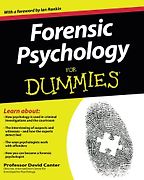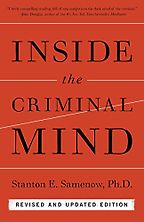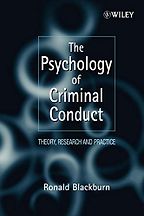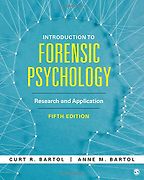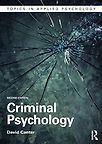Before we get to the books, let me first ask: what is forensic psychology, and what does it encompass?
This is not as easy a question as you might think, because it has quite an involved history and the term takes on slightly different meanings in different countries.
The first uses of the term were for any psychological contribution to the legal process in court—from the notion of forens, the Roman word for the ‘forum’ where disputes were resolved. The term ‘forensic’ then just came to mean for the courts. The psychological contribution consequently came to be expert opinion on matters such as whether or not a person was able to understand enough of the court process to be able to participate effectively, known as being ‘fit to plead’, or certain sorts of assessments of individuals for the court, such as whether the defendant at the time of the crime was capable of realising the consequences of their actions. In fact, a lot of that work in the early days was done by forensic psychiatrists—people with medical degrees who specialized in mental illness in a legal context.
Psychiatrists often relied on assessments made by psychologists. So slowly it became the case that psychologists would make the assessments for the courts, as well as or instead of psychiatrists. This was part of the scientific psychological process of developing various forms of assessments that could be used, for example, to tell whether somebody was mentally disturbed or whether or not they had particular psychological problems. Even issues such as whether the defendant was especially vulnerable to influence and may have falsely confessed were turned into standard assessment protocols used by forensic psychologists in court.
But then, with the development of psychology, and the broadening interest in the whole psychology of criminality, the term ‘forensic psychology’ took on a wider range of meanings, and began to be used to describe anything that related to criminals. Topics like the detection of deception—which wouldn’t necessarily be something that could be used in court, but became an area of research—could be regarded as forensic psychology. It even went so far as to encompass psychologists working with offenders in prisons.Dealing with things like aggression management, or relationship training sessions, also began to be called forensic psychology. So, it took on a rather broad definition.
Some countries, notably the British Psychological Society about 40 years ago, established a distinct division of Forensic Psychology. Up until that point, forensic psychologists had actually been clinical psychologists, in other words, their training had been in working with people with various sorts of mental disturbance or mental illness. Those who dealt with patients that came through the courts, for one reason or another—say somebody who had an alcohol problem and the court required them to go into some sort of alcohol rehabilitation sessions run by clinical psychologists—those were called forensic psychologists. In other words, forensic psychology was a branch of clinical psychology. But much to the annoyance of the clinical psychologists, the British Psychological Society recognised that there was a distinct profession of forensic psychology for people who were not initially trained as clinical psychologists.
This has all sorts of implications for the way the discipline is dealt with. Forensic psychology still has a very strong clinical orientation: looking at things like psychopathy and dealing with crimes that have a very clear, disturbed-personality quality. Rape and murder are very dominant in studies by forensic psychologists.
Rather inaccurately, I’m sometimes referred to as a criminologist. Criminology is the study of crimes; criminologists tend to study common crimes. They study things like delinquency and patterns of burglary. In the United States, it’s much more confused, partly because criminology in the United States has a much stronger psychological component. But in Britain, criminology tends to be more sociological in nature, or even an aspect of socio-legal studies.
“There is a strong mythology around the concept of offender profiling, fed by fictional accounts”
My most recent book is Criminal Psychology, which takes on an even broader range of issues. It’s an overview of the various ways in which psychologists explore anything to do with crimes and criminality. For instance, victimology, the study of who becomes victims and what the experience of being a victim is. That is an aspect of crime which has many psychological implications, but you wouldn’t immediately refer to it as forensic psychology, because it’s not immediately relevant to the courts. But you would find some forensic psychologists interested in the consequences of crimes for victims.
There’s no simple answer as to what forensic psychology is. In a nutshell, it’s research into, and the professional application of, psychology relevant to all aspects of the legal proceedings, but is often broadened to cover the psychology of crime and criminality.
You were a pioneer in the field of ‘offender profiling.’ This concept has really caught the public imagination, if the offering on Netflix or in my local bookshop is anything to go by. But are there any myths or commonly-held misunderstandings about this field that you’d like to correct?
Yes. Offender profiling, as you say, has become part of the public imagination. Whenever I give talks about offender profiling—unlike any other area of the social sciences I can think of—I have to start off by saying: actually, offender profiling is not what you think it is. There is a very strong mythology built around the concept of offender profiling, which is being fed by fictional accounts. I always point out that the fictional accounts actually owe more to Sherlock Holmes than they do to what psychologists might do in relation to police investigations.
I deliberately created the term ‘investigative psychology’ to get away from the limitations of offender profiling. I talked about three broad areas of police investigations that psychology can contribute to. One is the effective collection and management of information about a crime, to make it as useful as possible. This includes interview techniques, detecting deception—false allegations, confessions and other aspects of the material central to an investigation. That’s a big area of psychology that falls within investigative psychology.
Then there’s the whole business of what inferences you can make about an individual by the way the crime is committed, (including when and where) which—broadly speaking—is a slightly more technical way of describing offender profiling. That turns out to be a very complex process, and very challenging. The research shows that there’s relatively little clear evidence that profiles can be created the way that is often claimed, especially in fiction. One of the problems is that there are a lot of people who will go out and claim they are offender profilers, and will be very happy to give opinions to the police. But really, they’re usually doing little more than informed, intelligent detectives have always been doing. In fact, in some cases, what they offer is less informed and more useless than an experienced detective.
“I deliberately created the term ‘investigative psychology’ to get away from the limitations of offender profiling”
The third area is supporting police decision-making. This is based on an understanding of the complexities of an investigation. From this understanding ‘decision support tools’ are being developed. These may be check-lists of how to prioritise suspects or more complex computer-based systems such as my Dragnet software that uses where crimes occur to help to indicate where an offender is based.
It is important to emphasise that investigative psychology really is relevant to any investigation, not just criminal investigations. We’ve actually carried out research on the location of improvised explosive devices in Afghanistan, and we’ve looked at insurance fraud and benefit fraud. Even work on behaviour in emergencies, and crowd behaviour and management—which was where I started and how I was drawn into offender profiling—is part of investigative psychology. I would say all of these are real-world challenges, where the psychological contribution to those investigations makes special demands. This really makes investigative psychology a particular approach to problem-solving outside of the university laboratory that has dominated much of pychology.
Let’s talk about your book choices. The first is your own Forensic Psychology for Dummies, which earlier you described as “a real revelation to put together.” Could you tell me more?
The …for Dummies format is a very strong format. They have very clear guidelines, and a team of people working on it to make sure you fit the guidelines. They also have external assessors who will look at everything that you write to ensure it is valid.
I always have to apologize to people when I say: ‘You should read my book, Forensic Psychology for Dummies’ because in Britain, dummy is a term of insult. I always have to say, ‘actually, in America, it just means somebody who’s not an expert!’
When I was given the task of putting Forensic Psychology for Dummies together, I really had to embrace the whole discipline and find a way of dealing with it that was engaging and scholarly, without being pompous. They like, quite appropriately, to have case studies and additional anecdotes, so I was quite intrigued by being able to find enough material to fill the book. I’ve run courses now with non-specialists, the public at large. And I’ve turned to that book, from time to time, to decide what I’m going to do. Quite honestly, I read bits of it and think, ‘Oh, that’s interesting. I didn’t know that!’
I tend to write books on things I don’t know an awful lot about, as a way of getting on top of the material and getting to understand it. Forensic Psychology for Dummies was such a boot camp. I had to broaden my range of knowledge and issues, and find ways of illustrating them that would reach a popular audience. The book has done very well, by the standards of the sorts of books I publish; I think it hasn’t done quite as well as my book Criminal Shadows: Inside the Mind of the Serial Killer, which won the Gold Dagger award, but it has sold more copies than any other academic books I’ve written. So obviously it is reaching a wide market, people obviously find it intriguing and useful, and so do I!
Yes. ‘Accessible’ books like these, and the others in the …for Dummies range, or in Oxford University Press’s Very Short Introduction series, are often still very rigorous and give a nice broad overview. Perhaps we should move on to your second choice, a book first published in 1890. This is Havelock Ellis’s The Criminal. Could you tell me about it, and why it remains relevant?
It’s always intriguing to see the ways in which we rediscover things. I’ve been around long enough to hear people presenting ideas today, as if they were new, that I know we were talking about in the 1960s. Consequently, it’s always very healthy to look back at serious writing that deals with topics of the day. And The Criminal by Havelock Ellis is a remarkably sensible, well-informed book.
One thing that is fascinating in it, and it’s a very simple point, is that these days there are often processes set in place that will try and reduce recidivism. Typically, they say that they’ve been reasonably successful if about two thirds of the offenders reoffend. And if you’re looking at Ellis’s book, he talks about the reoffending rate being about two thirds. So it’s very salutary in that regard.
Many of the discussions about the backgrounds of these offenders and their particular characteristics are discussions that we’d recognize today. It’s a reminder that in many ways, we’ve not moved on tremendously in understanding criminality. Perhaps we understand it, but we’ve not really found a way of dealing with it. Or at least we’ve not found a politically acceptable way of dealing with it.
Writings from over a century ago do suggest that criminality is almost an inherent part of society, and that the idea of getting rid of it or of reducing it is a very optimistic one.
But there are other cultures in which criminality is much lower.
Yes, if you want to find the really nasty serial killers—enough of them to study—you’ve got to go to America. We have far fewer serial killers in Britain. There’s much more violent crime in America than there is in Europe, partly because of the access to firearms. And if you look at the crime rates of different countries, you’ll find they vary considerably.
The reason for this is complex, because it relates partly to what is legal or illegal in different countries. Obviously, if homosexuality is illegal, you get a very different pattern of criminality. But even if you take something fairly clearcut—like murder—the rates vary enormously between different countries. That is partly the legal system, partly the whole socio-cultural process. It does, to some extent, relate to how effective the police forces are. The differences between countries do indicate something important about the culture of those countries.
That’s the sort of thing that criminologists will look at, although I do deal with them, to some extent, in Forensic Psychology for Dummies.
Let’s go back to Ellis. He sounds like a fascinating character. He was also a sexologist, and later wrote what was probably the first non-moralistic study of homosexuality, Sexual Inversion.
That’s right. He broadened out into the early, systematic and non-moralistic studies of human sexuality. That’s what he’s most known for, his work on sexuality, and particularly what he then called ‘pathological’ sexuality. That was important, in late Victorian times, to begin to talk about issues that were just not spoken of.
He was also a eugenicist.
I was a bit worried when I discovered that—I didn’t want to support a eugenicist. But he pulled away from it. He decided that the direction it was going in was quite wrong. Like all of the major scientists and thinkers of the late Victorian era, he was very influenced by Darwin. He was alert to the idea that human genetics were likely to be distorted by the fact that certain subgroups might have more children than others. But once they started talking about sterilization, he pulled away from it. He had a much more ethical stance on eugenics than others at the time, seeing it as an issue to consider rather than something that should shape policy.
He was alert to the social processes that generate criminality, and the fact that these were likely to be reproduced within society, but I was pleased to see that he took a moral stance on how you deal with that.
Let’s move on. The next book you’ve chosen is Stanton Samenow’s influential 1984 book Inside the Criminal Mind, which was updated in 2014.
Yes, that’s one of a number of books that Samenow and his colleagues have written. What I like about it is the honesty with which, as psychologists, they described their interactions with criminals. They discuss, initially, various attempts to get people to stop being criminals. Broadly speaking, they kept finding that all they were doing was making them more plausible criminals, that is, they were giving them a vocabulary or way of thinking about things. In other words, they would think the criminals had decided not to offend anymore, and when interviewed they said all the right things to get parole, but in fact they continued to commit crimes. They had just learnt the answers they should give from the psychological interventions they’d been subjected to. This led Samenow to emphasize the thought processes that underlie criminality, the way criminals convince themselves that what they are doing is acceptable. He was one of the first people to start talking about ‘distorted cognition’ being part and parcel of criminal activity.
In my more recent work, I’ve looked at the personal narratives that criminals have: the storyline they think they’re living. That’s actually a development of those early notions that you’ve got to look at criminals in terms of their agency: what they decide to do, and how they justify to themselves that what they’re doing is acceptable. That’s what made me think this book, of all the books I’ve read about the psychology of crime, was the one that was the most honest and revealing about ways of thinking about criminality. It’s breaking away from the clinical psychologist view and the public view, that criminals are somehow or other mentally disturbed, or that it’s some sort of personality problem. As Stanton Samenow points out, that’s not very helpful.
I’ve seen criticism that this book overplays the agency of individuals, while underplaying other factors that affect whether or not one becomes a criminal. These are factors like poverty or an otherwise disadvantaged childhood. How do you feel about that?
Yes, well, that’s what I like about it, that it emphasises agency. A lot of the sociological explanations ignore the fact that people from very similar backgrounds can end up very differently. There are some nice studies of brothers, for example, one of whom becomes a murderer, and another who doesn’t. The difference is not in their nature or nurture, but decisions they make for themselves.
Although poverty and social processes can increase the probability of somebody becoming a criminal, it’s certainly not the whole explanation. These much more psychological explanations about agency are very healthy. In fact, I have argued that the social sciences generally are at variance with the legal approach to being human. The legal approach is entirely about agency—about the individual knowing what they were doing, knowing its consequences, and therefore they are guilty. If they didn’t, if they were mentally ill, and didn’t know what they were doing, then fine. That can help explain why they are not guilty (although in some legal systems you may be found ‘guilty but insane.’)
But most social science explanations, in a sense, take away the agency. They say it’s genetics, it’s personality, it’s hormones, it’s social upbringing, it’s culture, it’s context. All of these are external to the individual making the decision to commit the crime or not. I feel it’s very important to redress that balance.
That’s an interesting point. Let’s move onto Ronald Blackburn’s 1994 book The Psychology of Criminal Conduct.
This is a real compendium: a clinical psychologist’s perspective on criminal behaviour. And it’s a very thorough account. Blackburn was a very experienced clinical forensic psychologist in, if you like, the old tradition: he worked in a facility, what we call a ‘special hospital,’ but is really a prison for people who are regarded by the courts as mentally ill. He worked with these individuals over many years, and brought it all together in a very thorough account of all the clinical perspectives there are on criminal behaviour.
As you would expect, it tends to emphasise criminal activity that has a very strong psychological disturbance component to it; a lot of coverage of personality disorder, for instance, as well as sexual offences and violence.
Do you think that books like this are of interest to a layperson too? Or is this too much a specialist subject; should it stay in the hands of experts?
No, I think this whole area needs to be taken much more seriously by law enforcement agents and policymakers. Law enforcement, in particular, is way out of touch with developments in forensic psychology, investigative psychology and criminal psychology. Its very frustrating. I’ve done various projects with the police that have shown how we could improve their effectiveness, and they don’t take any notice.
That’s alarming. What sort of things?
Well, the law, broadly speaking, and law enforcement—the police—do not understand the scientific method. They do not understand how you develop a systematic account of a person’s activities. The legal process, in particular, still thinks of the way in which psychology may contribute as if it’s a branch of medicine. They’re always looking for some sort of disease or syndrome that they can use.
I’ve had some court cases in which it’s very obvious to me that there is a psychological contribution, but because I’m not prepared to say this person is ill in some way, it is not accepted by the court. I’ve often suggested that the legal process in particular is up to date with the psychology of about 1840. That was when they first introduced the idea of mental illness as a defence in a strong way. The legal system has not moved on from that.
“The legal process is always looking for some sort of disease or syndrome that can be used in court”
One of the consequences is that there are a lot of people who give expert opinion in court—in America in particular—who introduce all sorts of syndromes that are, from a scientific point of view, rather spurious and not very well established. But they’re able to take them into court, particularly if psychiatrists are presenting them, because they can say: ‘this is some sort of disease.’ Parental-alienation syndrome is a good example. This is where families are breaking up, and one of the parents is trying to alienate the child from the other parent. Well, that’s an understandable social process. But if you can put a label on it and say ‘it’s a syndrome,’ you can then get the courts to listen to it.
What is changing in Britain is that the police are becoming much better educated. They are talking about evidence-led policing. In America, they’re talking about predictive policing. Consequently, the newer generation of officers are beginning to understand the potential of contributions from psychology, but there’s still a long, long way to go.
What is predictive policing?
it’s just looking at the patterns of where crime occurs, and predicting where the next crime is going to happen so that police can be put in place to deal with it. Because they’ve got large datasets now, they can do it. Although actually, they don’t understand what they’re doing. And there are lots of confusions.
Right. We’re not talking Minority Report.
At a conference I was at recently, in Iceland, there was a very interesting presentation about how distorted all of that stuff is. There are problems, for example, of repeating the mistakes of the past by going to places where crimes have been detected and thus recorded, rather than identifying unreported crimes.
‘Evidence-led policing’ is also often misunderstood by the police because they think that’s what they’re always collecting: evidence that can be used in court. They don’t understand what scientific evidence is.
Interestingly, the senior police officer on the very first case I contributed to really put his finger on it. He said, ‘you know, up until now, we’ve been collecting evidence, but what we should be collecting is data.’ Thinking of it as a research process, rather than as just a legal process. But they’re still not there. They’re still not doing that.
Let’s move on to the final book, Curt and Anne Bartol’s Introduction to Forensic Psychology: Research and Application. This is the fifth edition, published in 2018. So it’s bang up to date.
The Bartols have devoted their lives to writing these very broad-based, very well-informed textbooks. It’s very much in the American tradition of the textbook, which is a really major undertaking—and they sell thousands of copies and make a lot of money out of them.
If you go onto the web and put in ‘forensic psychology books,’ you’ll get tens of thousands of hits. If you go onto Amazon, and put it in, you’ll get thousands of hits. There are many, many textbooks on forensic psychology, but I’ve chosen the Bartols’ because it seems to me it is the most thorough, partly because they’ve made a career out of bringing this material together.
In an earlier edition, they described some of my work and they got it wrong. But they contacted me, and I told them they needed to correct it. In the later editions, they have it correct. Unlike some other authors of textbooks they make an effort to get in touch with the various people whose work they’ve included.
“There are many, many textbooks on forensic psychology, but this seems the most thorough”
It’s got an American bias, inevitably. But if somebody wants a detailed overview of forensic psychology, this is probably the best. That’s my view. Forensic psychology is a very broad professional discipline. I thought we needed at least one textbook in there that would give people a good account of the field. It’s a nice contrast with my Forensic Psychology for Dummies, because in the …for Dummies series, you don’t put in any references—there are no citations. It’s not a lot of use to serious students of forensic psychology. But it’s a good start. The Bartols’ textbook would be the next step in obtaining in-depth coverage.
If people get in touch with me to say they’re interested in studying forensic psychology at university, I tell them to read Forensic Psychology for Dummies. But if they’re already studying psychology, then I say they need to get the Bartols’ book, because it is full of citations, and will give them a much more comprehensive overview.
Absolutely. They’re all excellent books. Maybe that leads us to my final question. What advice would you give to someone considering a career in the field of forensic psychology?
What people usually come to me saying is that they want to be an offender profiler. And I tell them to read Forensic Psychology for Dummies, so they’ll get a much broader understanding of what forensic psychology is. They will realise there are not really any jobs as an ‘offender profiler’. The very few that do exist are not what you would expect from accounts on TV.
Get the weekly Five Books newsletter
That’s the key message, though offender profiling seems to be exciting and sexy, in many ways it is actually quite a tedious activity. That’s partly because of the way the police operate, and partly because it’s very repetitive. But there are many other psychological contributions to crime and criminality that are much more interesting.
If somebody were to be interested in anything to do with psychology and crime, they need to open their eyes to the wide, wide range of things forensic psychology covers: everything from detecting deception, through to aggression management, and every crime from terrorism to burglary. It’s a very broad field. And the great majority of your work has to be done in the field, in an actual context with actual crimes, actual criminals. The thing is that if you develop the skills in how to study that sort of activity, you’ve got skills that are relevant for a wide range of other real-world research.
Interview by Cal Flyn, Deputy Editor
August 2, 2019
Five Books aims to keep its book recommendations and interviews up to date. If you are the interviewee and would like to update your choice of books (or even just what you say about them) please email us at [email protected]
Five Books interviews are expensive to produce. If you've enjoyed this interview, please support us by donating a small amount.
